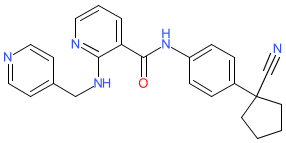GtoPdb is requesting financial support from commercial users. Please see our sustainability page for more information.
|
Synonyms: apatinib (in China) | YN968D1
rivoceranib is an approved drug (2014 (Chinese NMPA))
Compound class:
Synthetic organic
Comment: Rivoceranib (a.k.a. apatinib) is an orally bioavailable, small-molecule multitargeted tyrosine kinase inhibitor, with substantial inhibitory action against vascular endothelial growth factor receptor-2, but it also inhibits c-Kit and c-SRC tyrosine kinases [4]. The drug is administered as the mesylate salt (PubChem CID 45139106). Its principal clinical effect is as an angiogenesis inhibitor.
Ligand Activity Visualisation ChartsThese are box plot that provide a unique visualisation, summarising all the activity data for a ligand taken from ChEMBL and GtoPdb across multiple targets and species. Click on a plot to see the median, interquartile range, low and high data points. A value of zero indicates that no data are available. A separate chart is created for each target, and where possible the algorithm tries to merge ChEMBL and GtoPdb targets by matching them on name and UniProt accession, for each available species. However, please note that inconsistency in naming of targets may lead to data for the same target being reported across multiple charts. ✖ |
|
|||||||||||||||||||||||||||||||||||
| No information available. |
Summary of Clinical Use  |
| Apatinib is approved in China for the treatment of patients with non-small-cell lung cancer and gastric cancer, notably being the first tyrosine kinase inhibitor approved for gastric cancer. Apatinib/rivoceranib is being assessed in clinical trials as a treatment for metastatic gastric carcinoma, metastatic breast cancer and advanced hepatocellular carcinoma. Click here to view ClinicalTrials.gov's currently registered trials evaluating this compound. Apatinib has shown encouraging results in multiple trials [2] across a range of malignancies, as monotherapy or in combination with other therapeutics. Elevar Therapeutics announced that the FDA had granted rivoceranib Orphan Drug Designation as a treatment of adenoid cystic carcinoma in February 2021 [1]. |
Mechanism Of Action and Pharmacodynamic Effects  |
| Apatinib inhibits VEGF-induced endothelial cell migration and proliferation, and thus inhibits the angiogenesis essential for tumour growth and survival. Apatinib also appears to overcome multi-drug resistance (MDR) in certain tumour cells, by inhibiting the efflux mechanism of the MDR associated transporters ABCB1 and ABDG2, towards conventional antineoplastic agents [3]. |
| Clinical Trials | |||||
| Clinical Trial ID | Title | Type | Source | Comment | References |
| NCT02824458 | A Study of Gefitinib With or Without Apatinib in Patients With Advanced Non-squamous Non-Small-Cell Lung Cancer Harboring EGFR Mutations | Phase 3 Interventional | Sun Yat-sen University | This trial is evaluating the combination of EGFR inhibition plus VEGFR2 inhibition in NSCLC with EGFR mutations (Del19 and L858R). It will determine if dual pathway inhibition provides additional clinical efficacy, and/or is able to delay the emergence of tumour resistance. | |








